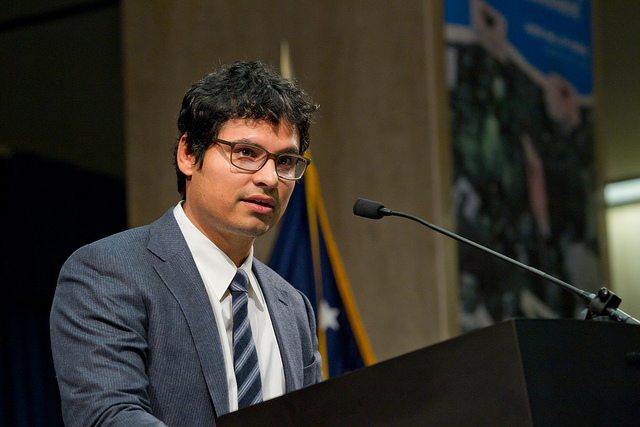The Cesar Chavez film walking a tightrope to succeed

 By Tony Castro, Voxxi
By Tony Castro, Voxxi
“But my father almost broke down in tears when I told him I got the role,” says Peña of what could be a breakout role in the upcoming feature film “Chavez.” “Now I understand why he got so emotional.”
Peña, the son of Mexican farmers who immigrated, is said to have a remarkable resemblance to the Cesar Chavez of the 1960s, according to sources who have seen scenes from the low-budget film. The film’s anticipated release has apparently been pushed back to early next year — and could be faced with walking a marketing tightrope to succeed.
Peña’s uncanny look-alike appearance was just typical of the attention to historical accuracy that Diego Luna, the Mexican actor directing his second film, demanded in the making of a film that meant recreating California in the 1960s.
Cesar Chavez film has its struggles

To recreate 1960s California — and do it within a $10 million budget — meant most of the filming was done in northern Mexico, often in scorching heat and harsh conditions.
But that may not have been the hardest part of getting the film made. Chavez died in 1993, and it has taken more than two decades for any production company to finally convince Chavez’s heirs to grant them the rights.
Chavez’s heirs wanted to protect his legacy, which has been tarnished in recent years as the union he formed, the United Farm Workers of America, has struggled and lost most of its power, losing members and seeing many of its historic labor contracts expire.
It is why the Chavez heirs demanded to see every script and to consult with Luna on changes they wanted.
“This is the first time Chavez is portrayed on film,” says Luna, best known for his role in the 2001 movie “Y Tu Mama Tambien.” “We are not making an exposé.”
Diego Luna: Cesar Chavez’s story is an American story
Luna also says Chavez transcends having been just a labor activist – that his is an American story about overcoming adversity and inspiring those who looked to him then and now.
“It’s about Cesar Chavez,” he says, “but it is also the story of an event that changed the life of a community and the perception the country had of this community, the seed he planted in the community and how it spread and gave confidence to a community that had been invisible.
“They found strength in their numbers and realized they could use their voice para una misma consigna, and they could be powerful and collapse an adversary.”
But the Cesar Chavez film has not been without its own difficulties, beginning with Hollywood’s slowness to warm to the Latino market. Thus, most of that money has come from Mexican investors.
Still, Luna and his Mexican production company Canana that includes his childhood friend and fellow actor Gael Garcia Bernal were able to get the commitment of major acting names, most of them doing the film for scale fees.In addition to Peña, other principal actors in the film include John Malkovich, who was originally just one of the producers but then took on the role of an industrial grape farm owner who opposes Chavez; America Ferrera as Chavez’s wife Helen; Rosario Dawson as union co-founder Dolores Huerta; and Garcia Bernal who makes a cameo appearance.
The screenplay was written by Keir Pearson, Oscar nominated for the script of the 2004 film “Hotel Rwanda.”
While the Cesar Chavez film is now expected to open close to Chavez’s birthday, March 31, which is observed as holiday in several states, some of the film’s Hollywood investment partners have relieved that the film will likely come out after the immigration reform legislation is passed – and avoid a potentially volatile political issue that could polarize and turn away some film-goers.
This article was first published in Voxxi.
Tony Castro is the author of the newly-released “The Prince of South Waco: American Dreams and Great Expectations,” as well as of the critically-acclaimed “Chicano Power: The Emergence of Mexican America” and the best-selling “Mickey Mantle: America’s Prodigal Son.”
[Photo by US Department of Labor, Facebook]
